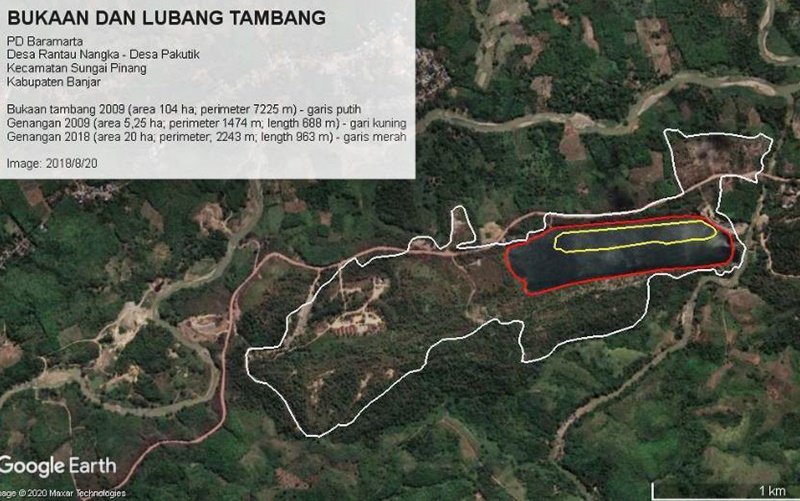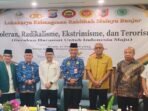Banjarbaru – Executive Director of Walhi Kalsel, Kisworo Dwi Cahyono hopes that mining companies in South Kalimantan will close the former coal mining land. “I got information that one resident died in a coal mine pit. “This incident cannot happen again, ” he said Saturday (5/9/2020).
Kisworo explained that there was an incident in June 2020. There was a man named Kasyful Anwar (40), a resident of Pakutik Village, Sungai Pinang District, Banjar Regency, reportedly drowned in a mine pit on the border of Rantau Nangka Village and Pakutik Village, Banjar Regency on Friday afternoon ( 12/6). On Sunday (16/6) at 10:00 am, it was reported that the victim had been found lifeless floating to the surface.
“Through the examination of Walhi South Kalimantan on a mining permit map in the South Kalimantan region, it is known that the coordinates of the hole where the victim sank was in the PD Baramarta concession. Baramarta is a Regional Company owned by Banjar Regency that holds a Coal Mining Exploitation Work Agreement (PKP2B) with the status of Production Operation,” he said.
Kisworo said, furthermore, the examination of the mine hole was carried out through a Google Earth satellite image map in 2018. It was found that a 20 hectare pool of acid mine drainage was found from a hole with a length of 963 meters and a circumference of 2,243 meters. Observed in the image of this mine hole has indeed been left uncovered.
Looking at the image map ten years earlier — in 2009 to be precise — Baramarta was seen operating in this area for the next few years. At that time, the area of open land belonging to Baramarta was 104 hectares and a pool of acid mine drainage of 5.25 hectares in a 688 meter hole. In 2012, it was seen that reclamation had been carried out on mine openings, but not at mine pits. The mine hole is still gaping.
The Baramarta mine pit coincides with the river and even merges on some sides. This also clearly contradicts the regulations governing river border protection. For example, Government Regulation Number 38 of 2011 concerning Rivers, regulates river boundaries of at least 50 meters to the left and right of rivers for small rivers and up to 500 meters for large rivers.
River borders whose function is for conservation should not also be mined. According to Government Regulation No. 78/2010 concerning Post-Mining Reclamation, mining companies should close mine holes after dredging.
However, the nearly one kilometer long puddle of acid mine drainage in the Baramarta concession shows that the reclamation action was not carried out completely, causing casualties. Walhi South Kalimantan has demanded that Baramarta be responsible for the victims who drowned and closed their mine holes. The local government of Banjar Regency must prioritize the safety of the people by complying with applicable regulations. Baramarta, which was reported to have always received the Blue Proper, turned out to have a deadly mine hole. This is an indication that the criteria for awarding the award differ from conditions in the field.
Walhi South Kalimantan also demands the Ministry of Energy and Mineral Resources to revoke the Blue Proper status of PD Baramarta. In fact, giving such awards is useless when a victim drowns in the Baramarta mine pit. Apart from taking lives, mine pits containing acid mine drainage (AAT) are also endangering lives. AAT which contains dangerous heavy metals if released into rivers will pollute river ecosystems which in turn also have a negative impact on humans, especially for children and women’s reproductive health.
There are many cases of children born with defects due to their mother coming into contact with water contaminated with heavy metals. Incidents like this — death in mine pits and water pollution — can happen again considering that there are still many holes and mining permits in South Kalimantan. These permits are located near settlements and public facilities which make the residents’ activities closer to this deadly mining pit.
In South Kalimantan there are 814 mining pits spread across eight districts. Banjar Regency has 117 mining pits, making it the third largest after seasoning soil (264 holes) and sea land (223 holes). The holes are inside and outside the concession. There are 638 holes in 123 concessions. This means that 176 holes outside the concession are suspected of being illegal mining or mining without a permit (PETI).
In addition to reclamation regulations that are not being complied with and sneaky companies that don’t pay reclamation guarantees, there are lines of regulations that are often violated by mining companies. One of them is Law number 32 concerning Environmental Protection and Management. Laws that should serve as guidelines to be obeyed are violated. Environmental Impact Analysis (AMDAL) is only a formal document to legitimize exploitation. Mining activities that are extractive and have a high risk of safety for the people should be stopped.
Apart from destroying landscapes, coal mining is also destroying the political landscape. The coal that supports the oligarchy also destroys the bureaucratic order, leading to overlapping licenses and corruption of state officials. Unfortunately, the government does not reflect on the many cases of death in mining pits that have occurred in various places and the massive environmental destruction caused by mining.
The government actually provides a red carpet for mining entrepreneurs through the new Minerba Shrimp Law which was passed on May 12, 2020. The government, which is supposed to protect the people, has even blessed the victims of the falling mines by passing laws that completely do not side with the safety of the people and deprive the people of their rights. Walhi South Kalimantan invites the public to continue to encourage the government to stop the dirty mineral and coal mining industry, one of which is by rejecting regulations that only favor investment but neglecting people’s safety and the environment, such as the Minerba Law.
The Regional Executive Director of Walhi South Kalimantan, Kisworo Dwi Cahyono, stated that he urged the Government to enforce the law against companies holding mining permits that one by one kill the people through their death holes. “I urge the Governor and the Head of South Kalimantan Police to form a mining crime task force, then immediately conduct an audit of mining permits so that there are no more victims,” he said.
anang









